Goat Milk Formula Vs. Cow Milk Formula
This post may contain affiliate links. As an Amazon Associate, I earn from qualifying purchases. Please read my disclosure.Is goat milk formula healthier than cow’s milk formula? What are all of the factors to consider when choosing between goat milk formula vs. cow milk formula? In this comprehensive guide, you’ll learn about the difference between cow and goat milk formula, the pros and cons of each, and how to choose whether to use goat formula vs. cow formula for your baby!
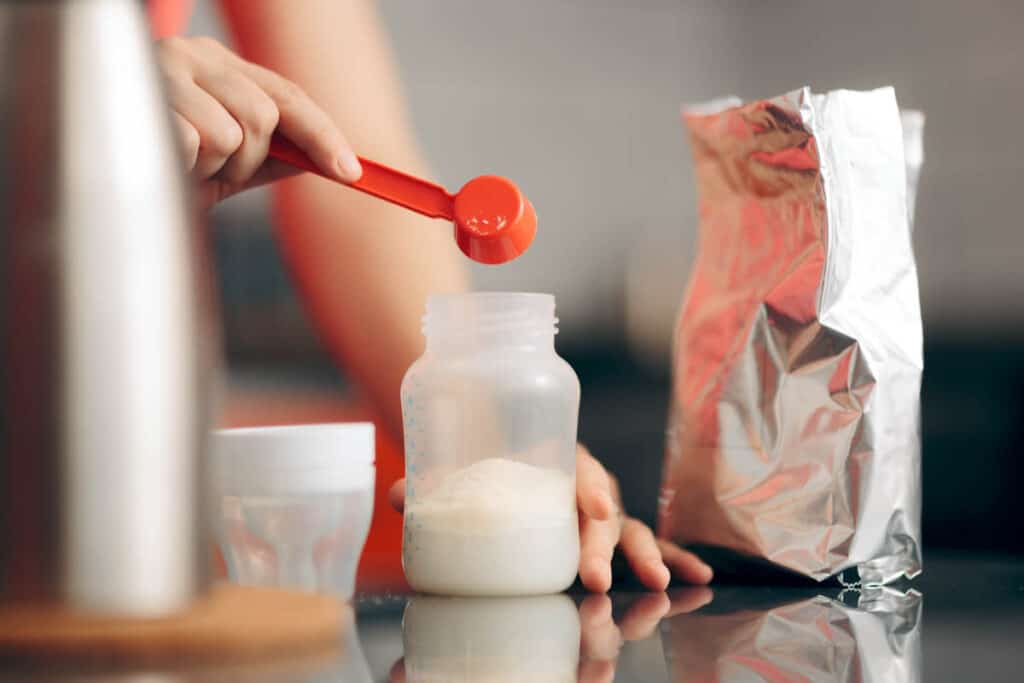
Finding the best baby formula can be a challenge sometimes – and understandably so! There are so many different types of baby formula on the market, it’s so important to find the right formula for your baby – one that they tolerate well, and that has ingredients you can feel good about.
If you’re using formula for any number of totally legitimate reasons: (breastfeeding is too mentally & physically exhausting / painful, your baby is allergic to a protein in your breastmilk, you adopted or had a surrogate, or you need to supplement just because!) – you want to make sure what you’re feeding your babies and toddlers is the best. And, it’s so hard to sort through the hundreds of types of baby formula on the market!
If you’re just starting out, here is a comprehensive guide to the best organic baby formula, and my best goat milk formula guide, which ranks all of the options in a handy chart. But this post is dedicated to the differences between cow’s milk formula & goat milk formula, and the pros & cons of each!
What Are The Different Types of Baby Formula?
Besides goat milk vs. cow milk for babies, there are so many other different types of baby formula available! Here is a quick summary of your baby formula options:
- Organic Cow’s Milk Based Formula: Organic milk formula assures that at least 95 percent of all the ingredients and processing aids are organic and that the product is free from preservatives, pesticides, insecticides, toxins, artificial colors, and artificial flavors.
- Non-Organic Cow’s Milk: Non-organic cow’s milk formula is still made from cow’s milk (hence the name), yet it might contain hormones, chemicals, and pesticides since it is not organic.
- Organic Goat’s Milk Baby Formula: Organic goat milk baby formula is similar to organic cow milk formula in that it’s non-GMO and free from pesticides, toxins, preservatives, etc. The main difference is that goat milk is the base for this type of formula, vs. cow’s milk.
- Non-Organic Goat’s Milk: Non-organic goat’s milk is more common than its organic counterpart. However, it is a popular option because non organic goat milk still has the A2 vs. A1 milk protein.
- Partially Hydrolyzed (Hypoallergenic Formula): Hydrolyzed formulas have partially (or completely) broken down milk proteins, which may help babies with a milk protein allergy or who just have more sensitive tummies.
- A2 Milk: A2 milk is a safe alternative to regular cow’s milk that is often easier for babies to digest. A2 milk can come from goats, or from a small population of cow’s that happen to produce A2 vs. A1 milk.
- Soy-Based Formula: These soy milk formulas don’t contain any milk and use soy protein as the base. They are a non dairy formula option. Note: You should always consult your pediatrician before considering a soy formula for your child, due to research that shows it may not be suitable for all babies.
- Toddler Formula: While most toddlers don’t need formula, toddler formula is designed to be consumed after a child’s first year of life. Essentially, it is a kind of transition formula, and can be used to supplement a picky eater’s diet with critical nutrients.
- Plant Based Baby Formula: Plant-based formula is made without using animal products. Basically, you can think of it as being a dairy free baby formula or vegan formula option. Formulas like Else and Baby’s Only Pea Protein are common vegan formulas available in the US. See this guide for the best dairy free and vegan baby formula.
- Powder Vs. Liquid: Most all natural infant formula comes in a powdered option, where you have to mix the water before serving. Some powdered formulas will also have a liquid option, which means the formula is already pre-mixed and pre-made so you can feed it to your baby immediately. Liquid formulas are also known as “ready to feed” formulas.
What Is Goat Milk Baby Formula?
Goat milk baby formula is a type of infant formula made from goat’s milk. It is an alternative to cow’s milk baby formula and contains essential nutrients for babies who are either partially breastfed and partially formula fed, or exclusively formula fed.
Goat formula is very similar to dairy-based formulas in terms of meeting your child’s nutritional needs, and is naturally high in protein, calcium, potassium, and vitamin A. But, because it’s made from goat milk which contains the A2 milk protein (vs. A1 for cow’s milk), it may be easier for some babies to digest who are intolerant to cow’s milk or are sensitive to lactose. The fat in goat’s milk may also be easier to digest than the fat in cow’s milk.
What Is Cow Milk Baby Formula?
Most infant formula is cow’s milk based. The cow’s milk is altered to resemble breast milk, so that it has the right balance of nutrients – vitamins, minerals, proteins and fats – that babies need. Cow milk contains more lactose than goat milk, and has a different type of fat composition and milk protein. Most babies can tolerate cow’s milk formula well, but some babies may react to either the proteins in cow’s milk or the fats in cow’s milk, making it harder for those babies to digest.
Cow’s milk is naturally high in Vitamin B12, selenium, folic acid, and protein. Because both cow and goat’s milk-based formulas are altered to mimic the composition of breastmilk, they are fortified with the vitamins and minerals that they may not include naturally, making them very close in nutritional value.
Differences Between Cow Milk And Goat Milk Formula
All baby formulas are fortified with vitamins and minerals to ensure that they have the correct balance of nutrients for your baby’s age, and this goes for both goat’s milk vs cow milk formula. Additionally, both types of formula contain the right proteins, fats and carbohydrates to ensure proper growth and development.
However, there are a few differences between the two. Here’s an overview of the differences between cow milk vs. goat milk formula, and below we’ll go into some of the significant differences in more detail!
- Nutritional Content: Both cow milk or goat milk formula for babies are good sources of protein, fat, vitamins, and minerals that are important for a baby’s growth and development. However, the nutritional content of cow milk and goat milk differs slightly. Goat milk is naturally higher in certain nutrients, such as vitamin A, calcium, and some types of essential fatty acids, while cow milk is naturally higher in vitamin B12 and folic acid. But as I mentioned – all formulas end up fortified with the vitamins and minerals they may be missing naturally, so this isn’t a huge difference between goat milk and cow milk formula.
- Digestibility: The protein and fat molecules in goat milk are smaller than those in cow milk, making them easier to digest. Additionally, goat milk is naturally lower in lactose than cow milk, which may make it a good option for babies who have difficulty digesting lactose.
- Taste: Goat formula has a slightly different taste than cow milk formula, which some babies may prefer, or some babies may not like as much! Goat milk has a creamier and slightly sweeter taste compared to cow milk, but also has a more distinct “goaty” taste and smell.
- Price: Goat formula is generally more expensive than cow milk formula. This is because goat milk is less common and producing goat formula may cost more.
- Availability: Cow milk formula is more widely available than goat formula, which can make it a more convenient option for some parents.
Goat Milk Vs. Cow Milk Formula: Nutritional Content
Fats
The fat content in goat vs. cow milk are similar, but the fat composition of goat and cow milk is different. Goat milk has more medium-chain fatty acids, which can be easier to digest and are more quickly absorbed by the body. Cow’s milk has more long-chain fatty acids, which can be harder to digest.
Proteins
Both goat milk vs cow milk formula for babies contain the two types of milk protein: whey and casein. In regular goat milk or regular cow’s milk – casein is the main protein and makes up about 80% of the total proteins in milk.
However, when both goat vs cow milk for babies are converted into formula milk, manufacturers will adjust the protein ratio to match human breastmilk (where the whey to casein ratio is about 50:50 or 60:40 in mature milk).
Whey is typically easier to digest, so PRE and Stage 1 formulas will typically have a little bit more whey compared to Stage 2 and above formulas. As your baby’s digestive system matures, they can digest more casein.
When it comes to the beta-casein protein found in both types of milk, there are two types of casein. There’s A1 casein protein and A2 casein protein, the latter of which is easier to digest. Goat milk is naturally made up of A2 casein protein, whereas cow’s milk is naturally made up of A1 casein protein. You can find A2 cow’s milk but it’s rare and expensive, because only a small number of cows in the world produce A2 milk.
When it comes to easy digestion in comparing cow formula vs goat formula, goat formula has a slight advantage over cow’s milk formula because of the A2 protein. This may make it a better option for babies with sensitive digestive systems, or for babies who seem to have a sensitivity to cow’s milk protein. Keep in mind, babies with a diagnosed cow’s milk protein allergy will likely still have an allergic reaction to goat’s milk, because of the similarity in composition of the two types of milk overall.
Carbohydrates
Both cow and goat milk contain lactose as the main carbohydrate and sugar. When it comes to cow milk vs goat milk for infants, goat milk does contain less lactose than cow’s milk, so it can be a better option for babies who are sensitive to lactose.
Goat Milk Baby Formula Vs. Cow Milk Formula: Taste And Consistency
Cow’s milk and goat’s milk have different tastes due to variations in their composition, such as the type and amount of fat and proteins. Here are the main differences in taste and consistency between cow’s milk and goat’s milk:
- Consistency & Creaminess: Fresh goat milk has a creamier texture and taste due to the smaller size of its fat globules compared to cow’s milk. This creamy texture can make goat’s milk feel richer and smoother on the tongue, and translates over to goat formula as well. Cow’s milk is also quite creamy though, and has a smooth consistency as well.
- Homogenization: One of the cool things about goat milk is that it’s naturally homogenized, which means the fat doesn’t separate and float to the top of the milk. Cow’s milk has to go through the manufacturing process of homogenization in order to ensure the fat doesn’t separate and the milk remains creamy.
- Tanginess: Goat’s milk has a tangier taste compared to cow’s milk, which some people describe as a “fresher” taste. This tanginess is because of the increased amount of caprylic acid in goat milk, which is not present in cow’s milk.
- Sweetness: Goat’s milk has a slightly sweeter taste than cow’s milk, due to the naturally occurring sugars in the milk. This can make goat’s milk formula more palatable for some babies.
- Overall Flavor & Aftertaste: Goat’s milk can have a stronger flavor and aftertaste than cow’s milk. Some people describe the aftertaste as slightly “gamey” or “earthy,” while others find it pleasant and mild. If you’re switching to goat milk baby formula from cow’s milk formula, your baby may have trouble with the formula at first, since it will taste different. But after a little while they should get used to it!
- Color: Goat milk typically looks more white than cow’s milk. This is because goats convert the carotene in their food more efficiently to Vitamin A than cow’s do. The carotene is what gives cow’s milk a more yellowish / cream white tint.
Overall, taste is subjective, and some people may prefer the taste of cow’s milk, while others prefer goat’s milk. When it comes to baby formula, it is important to consider your baby’s individual preferences and consult with a healthcare provider before making any decisions.
Goat Vs. Cow Formula: Preparation Guidelines
Overall, preparation of cow’s milk vs. goat’s milk formula is very similar. The difference will depend on the type of formula you’re using — ready to feed will have a different preparation compared to powdered formula, for example.
But essentially, if you’re using powdered formula, you will need to mix it with filtered water, or water that has been boiled and then cooled down. When it comes to preparing goat vs. cow formula, the key is to just follow the directions on the formula container itself to ensure you’re using the right type of water and the right water to formula ratio.
When it comes to goat milk formula, there are actually quite a few options on the market today, and most of these brands come in at least 3 stages to adjust to the needs of your baby as they grow. The 10 best goat milk formulas I’ve found (these include both organic European baby formula and US baby formula) are:
How To Choose Between Goat Milk Formula Vs. Cow Milk Formula For Your Baby
So what’s the bottom line on goat milk formula? Is it healthier than cow’s milk? Is goat milk better than cow milk for babies?
The answer is: It depends. Goat milk formula can be better, but a variety of factors will determine whether it’s better for your baby. Here’s what to consider when choosing between goat milk vs. cow milk baby formula:
#1: Nutritionally, goat milk & cow milk are similar. Despite the differences in goat vs. cow milk formula in terms of naturally occurring nutrients, all formulas are fortified so they include the right balance of vitamins & minerals to mimic breast milk, and have similar health benefits to each other. Some studies suggest that the nutrients in goat’s milk are easier to absorb than cow’s milk, which might give goat’s milk a slight benefit over cow’s milk formulas.
#2: Organic standards. This is very important – but neither goat or cow milk formula for baby wins here – it all depends on the farm and the producer (e.g. goat milk isn’t going to be organic “more often” than cow’s milk or anything like that). Also, while you may hear that cow’s milk has more hormones or antibiotics than goat’s milk, that’s not true if the milk is organic, since organic farming (whether it’s goat or cow) prevents the use of antibiotics and hormones across the board. Additionally organic farming is better for the environment because it prohibits the use of pesticides and other insecticides which can damage the soil and the surrounding environment. This applies to all organic infant formula – both organic cow and organic goat milk formula.
#3: Tolerability. Goat milk is often said to be a ‘hypoallergenic’ alternative to cow’s milk because many families report that it’s less likely to be troublesome for their babies who are sensitive to cow’s milk proteins. Additionally:
- Goat milk doesn’t contain the type of casein protein, alpha-S1, that can be problematic in cow milk – which gives it a leg up here.
- Goat milk protein generally forms a smaller, softer, and looser curd in the gut than cow milk (which makes it gentler). And, goat milk protein curds are broken down (degraded) faster than those from cow milk proteins. This may help babies with sensitive digestive systems or reflux tolerate goat formula a little better.
- Regarding lactose in cow vs goat formula, goat milk formula does contain a little less lactose than cow’s milk, which could make it easier to digest.
- This makes goat milk naturally easier to digest and, for some children, better tolerated!
- Note: If your baby has a diagnosed dairy allergy (confirmed cow milk protein allergy – CMPA), goat milk may trigger an allergic reaction in the same way that cow’s milk would!
#4: Protein composition. Many of you have asked me whether goat milk formula is dangerous for babies because goat milk naturally contains a higher amount of protein than breast milk. Also, like cow milk, goat milk naturally contains much less whey protein than breast milk. To account for this, goat milk baby formulas adapt their protein to be safe and suitable for little ones and, they also will add whey to balance this out. All of the goat milk formulas I’ve listed above mimic the whey casein ratio of human breast milk pretty closely.
A Note On Cow’s Milk Allergies
Babies who have a milk intolerance could have a sensitivity to lactose, to cow’s milk protein, to milk protein overall, or all of the above. Lactose intolerance can be characterized by: loose stools, bloating and gas, reflux, nausea, diarrhea, and excessive crying after feeding. Babies who have a cow’s milk protein allergy may have all of these symptoms and may also have: vomiting, abdominal pain, eczema and rashes.
If you suspect your child has a milk protein allergy, make sure to talk to your pediatrician immediately. Depending on the severity of your child’s allergies they may be able to tolerate goat milk better than cow milk formula. However, many babies with a cow’s milk protein allergy will also react to goat milk protein, because of cross-reactivity between the two allergens. If your baby is not able to tolerate either type of formula, and you will have to use a truly hypoallergenic baby formula where the lactose and milk proteins are broken down. It’s important to consult your pediatrician before choosing a baby formula or switching to a new formula for your baby.

Goat Milk And Cow Milk Formula FAQs
Overall, there is no one-size-fits-all answer to whether goat milk or cow milk baby formula is better. The best formula for your baby will depend on several factors, such as your baby’s individual needs, any allergies or sensitivities they may have, and personal preferences.
Goat milk formula may be slightly better than cow milk-based formulas for these reasons: easier to digest short and medium chain fatty acids, less allergenic properties in the protein composition (A2 vs. A1), and less lactose.
However it’s important to note that some babies will not like the taste of goat milk formula, and goat milk formula can be more expensive than cow’s milk formula and may be more difficult to find in some areas (although, you can always order it online!)
Yes. Goat milk formula is easier for babies to digest than cow’s milk formula. This is due to the reduced lactose, smaller fat molecules, and A2 vs. A1 protein structure.
Babies who have a sensitivity to cow’s milk may find goat milk to be a good choice, as it may be easier to digest and more tolerable. That said, neither goat milk vs. cow milk infant formula may be appropriate for babies who have a severe milk allergy, as goat milk is similar enough to cow milk in its structure that babies with a severe allergy will still react to goat milk.
It depends on the brand of goat milk formula! If the goat formula you are purchasing is sold in the US, it is going to be FDA regulated at the very least. The FDA requires that all infant formulas, including goat milk formulas, be processed and manufactured in a way that minimizes the risk of contamination or other safety concerns.
If the goat formula you are purchasing is sold and produced in the EU, then it will be regulated by the European Union and approved by the EU. Under “Operation Fly Formula,” which came out of the formula shortage in the United States, The USDA and the Department of Health and Human Services (HHS) allowed for import of European infant formulas that met U.S. health and safety standards, without explicit FDA approval.
Typically, organic baby formulas are going to be the closest in composition to breastmilk. While no formula can completely replicate the unique composition of breast milk, most formulas are designed to be as similar as possible to breast milk.
While all formulas are designed to provide a close match to the nutritional composition of human milk, organic infant formulas provide the closest match, because they don’t use any pesticides, antibiotics, hormones, syrup solids, or synthetic ingredients that can still be found in non organic baby formulas.
Yes, goat milk formula does taste different than cow’s milk formula. Typically, goat formula is stronger in taste and has a creamier, fresher, but also slightly gamier taste than cow’s milk. Some babies prefer this, and some do not!
While there are both pros and cons of goat milk formula, there are three main disadvantages of goat milk formula vs. cow milk formula for babies. They are:
1) Limited availability: Goat formula may be harder to find in stores, and there are fewer options of goat milk formula compared to cow milk formula. However, goat milk formula can be found online!
2) Cost: Because it’s not as widely available, goat formula can be more expensive than cow milk formula.
3) Taste: Goat milk has a stronger taste and can feel more “gamey” vs. cow’s milk which has a milder taste overall, and some babies just may not like it.
The answer is, it depends! One important distinction to make here is that there is a difference between regular goat milk vs. regular cow milk and goat milk formula vs. cow milk formula.
Regular goat milk or cow milk for baby can be very dangerous, as regular milks are not modified the way formula milks are to meet the nutritional requirements for babies aged 0-12 months.
But when it comes to toddlers, most babies over 12 months of age can transition to regular whole milk. So if you’re choosing between goat milk vs. cow milk for toddlers, you should pick an organic, whole milk that your toddler enjoys drinking and that they can digest. If they have trouble digesting regular cow’s milk, try regular goat’s milk instead and see how it works for them!
When it comes to switching formulas, whether you’re going from cow to goat or switching from goat to cow formula, the key is to do it very slowly, over a period of 1-2 weeks, so your baby has time to adjust.
Typically I recommend that you increase the amount of the new formula by 1oz each day, and decrease the amount of the old formula by 1oz each day in every bottle you give to your baby. This can take up to 7 days if your baby is drinking 7oz bottles. You may need to go up by only 1/2 an ounce if your baby is particularly sensitive to the formula’s new taste, in which case it could take 2 weeks to fully transition.
More Helpful Baby Formula Guides!
- Best Baby Formula For Constipation
- Best Formula For Reflux
- Kabrita Goat Milk Formula Review
- How To Transition From Breastmilk To Formula
- Kendamil Formula Review (also includes details on Kendamil goat vs. cow formula)
- Bobbie Formula Vs. Similac Formula
- Bobbie Vs. Kendamil Formula
Final Thoughts
When choosing between cow milk and goat milk formula, it is important to consider your baby’s individual needs, any allergies or sensitivities they may have, and to consult with your pediatrician.
Goat milk formula can be a good option for babies who are having trouble digesting cow’s milk formula or have a mild sensitivity to lactose. But babies with a diagnosed cow’s milk protein allergy may not tolerate either cow or goat milk formula.
There is obviously no “perfect” formula out there, but I look at the following factors when choosing the best formula: organic standards, non-GMO, natural ingredients, no added sugars, healthy fats, no synthetic ingredients, and as close as possible to breastmilk in composition.
Both types of formula provide essential nutrients for infants who are not breastfed, and the decision of which one to use will depend on several factors, such as your baby’s tolerance and preference. I hope this guide helped outline cow and goat milk formula pros and cons, and helped you figure out which formula will work well for your baby! And as always, before making a formula choice or switching formulas, make sure to contact your pediatrician first!









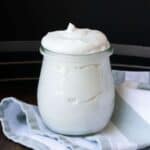


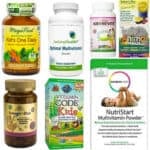
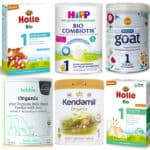



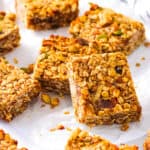












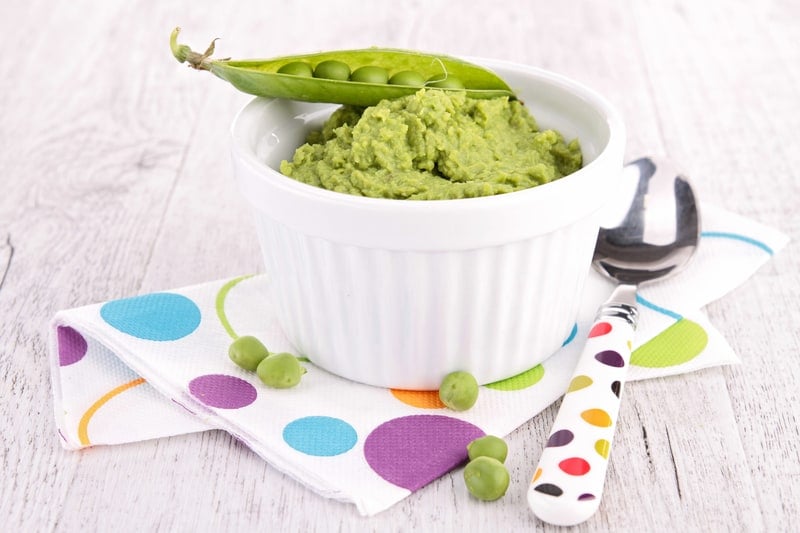



Hi! I’m a mom who is looking for the best formula for her 3months old baby I need a name of a formula that is better ingrédients than all others and is goat formula better than cow?
Hi Mimi! I would recommend Jovie Goat Milk Formula – it’s one of the best options for goat milk formula on the market today. Goat milk formula can be better than cow’s milk for babies who have trouble digesting the A1 protein in cow’s milk! You can also find more great goat milk formula options here. Hope that helps, let me know if you have any other questions!
Hi Anjali! I don’t even know where to start, my baby is being in 6 different formulas already since he was born. We recently switched from Bobbie to Kendamil Goat, during the transition, lo got stomach flu, (we thought it was the formula) we stoped giving him goats milk, per pediatrician recommendation we started giving him goats milk again but she said I don’t need to mix it or anything since he had already tried it.
Now it’s being two days of just taking Kendamil and he is having like diarrhea poop, twice a day, it is yellow and watery at times.
Is this normal when switching formula or is more a reaction to the formula? Or it could be his GI is still sensitive from GI flu that he got.
Thanks!!!!!
Hi Jenny! I’m so sorry to hear that it’s been difficult to find a formula that works for your little one! Given that he’s just getting over a stomach flu, and it’s only been two days on the formula, it could be that he’s still reacting to the stomach bug / that his digestive system is still super sensitive. That said, it’s really hard to know without seeing him whether he is reacting to Kendamil Goat negatively or not. I would talk to your pediatrician and get their opinion – because without knowing more about your baby I can’t give you a definitive answer either way!
Help! My 8 week daughter has been on formula exclusively since 6 weeks. We chose Hipp Dutch stage 1 due to the reviews and clean formula. However, she became very constipated one week into formula use. She does have 1-2 BM a day but she strains very hard, turns extremely red and cries uncontrollably until she’s done. Her stool is pellet like rabbit stool. Some mucus has been seen on a few diaper changes. I ordered Hipp pre HA but still awaiting my order although I shipped overnight 2 days ago! My question to you is should I just go straight to goats milk? How long do I give the HA Hipp to work? .
Hi Laura! How quickly did you transition her from breastmilk to formula? You mentioned she started at 6 weeks, did you switch cold turkey or did you transition her slowly over 1-2 weeks? If it’s the former, that could be why her stool changed so dramatically. If you transitioned slowly, then it likely is an issue with the formula. When you start HiPP PRE HA, I would transition slowly again – over a period of 1 week – and see how she does. If, after 1 week on full HiPP HA she hasn’t improved, then I would switch to goat milk formula (assuming your pediatrician is ok with it!) Hope that helps!
Hi,Anjali!
Thank u so much for athis helpful and informing article. I have a question regarding Babys Only by Nature’s One. It’s also for toddlers. Is it appropriate for 3 months old by nutritional value? As my ignorant pediatrician didn’t even try to look at the nutritional table, said that it’s no good. And I read also that people used for infants. Help please. Thank u so much!
Hi Nina! Technically Baby’s Only is a toddler formula. The company does say that their formula meets the nutritional requirements for infants, and I know parents who use it for babies under the age of 1, but I can’t advise you to use it for your infant if your pediatrician doesn’t recommend it. Instead, I’d recommend using Bobbie Organic Infant Formula which is made in the US, and has really high quality ingredients! Hope that helps!
I am so glad I just stumbled across your blog, very informative. My nephew who I babysit quite a lot has allergies mainly to milk, wheat flour And eggs. So the doctor suggested a soy milk based formula. I am skeptical about soy milk in general and especially for a 6 month old baby. Is there any formula that you suggest that could suit his allergies better while provide him the nutrients needed. Thank you
Hi There! I’m with you about soy based formula – I’m not a fan of it because of all of the studies I have seen regarding the impacts of too much soy during infancy. Does your nephew have a diagnosed milk protein allergy? If so, he could try a goat milk formula, HiPP HA or HiPP Comfort, but if those don’t work for him he may have no choice but to use Alimentum, Nutramigen, or an amino acid based formula (which have less ideal ingredients, but are more broken down than any formulas Europe has to offer!) Hope that helps, let me know if you have any other questions!
We switched our daughter to Kabrita formula when she was about 4 months old (yes, we talked to our pediatrician) to address her reflux. She vomited all the time. Since switching her over, the refluxing has stopped and her tummy is happy. This is our story: https://giveagirlagoat.com/goat-milk-formula-is-an-option-for-baby/
Of course breast is best, but sometimes mommies can’t nurse, and since my daughter is adopted, nursing her wasn’t an option for me. I’m very happy we found Kabrita.
This is so great to hear! I’m so glad Kabrita worked for you!
I don’t see a newborn (under six months) goat milk formula available at Kabrita’s website. I did some research and there is a Kabrita gold? For infants. It has the same goat logo but it’s made in the Netherlands. Is this the same company? Does Kabrita offer newborn formula? If not, how much worse is Holle compared to Kabrita?
Hi Fahed! The Kabrita for infants in the Netherlands is not a formula I’d recommend because they use glucose syrup solids in their formula. The Kabrita made in the US is way better than the Netherlands one, and while it is marketed for toddlers, it meets the nutritional requirements for infant formula and I know a lot of moms who have used it for their infants with pediatrician approval. So if your pediatrician is ok with Kabrita USA, it should be fine to use for your baby. That said, Holle Goat is also a great option for infants — the main differences between Holle and Kabrita USA are that Holle has added maltodextrin and has a whey-casein ratio that is not as close to breastmilk as Kabrita’s whey-casein ratio — which means that Holle has a tendency to constipate infants more than Kabrita. That said, I know a lot of babies who do fine on Holle Goat, so it really just depends on how your little one’s digestive system adjusts to it! I hope that helps!
What do you think of Bambinchen Stage 1 Goat compared to Kabrita and hipp dutch?
Hi Candice! It looks like Bambinchen Stage 1 isn’t organic and it does have a few processed ingredients like taurine, tryptophan, etc. but other than that the ingredients list is pretty clean. It doesn’t have probiotics or DHA added either — so it’s not really comparable to Kabrita or HiPP Dutch. I’d say both Kabrita and HiPP Dutch have better ingredients, Kabrita is in the process of getting their organic certification, and HiPP Dutch is certified organic – so they’re both better options than Bambinchen.